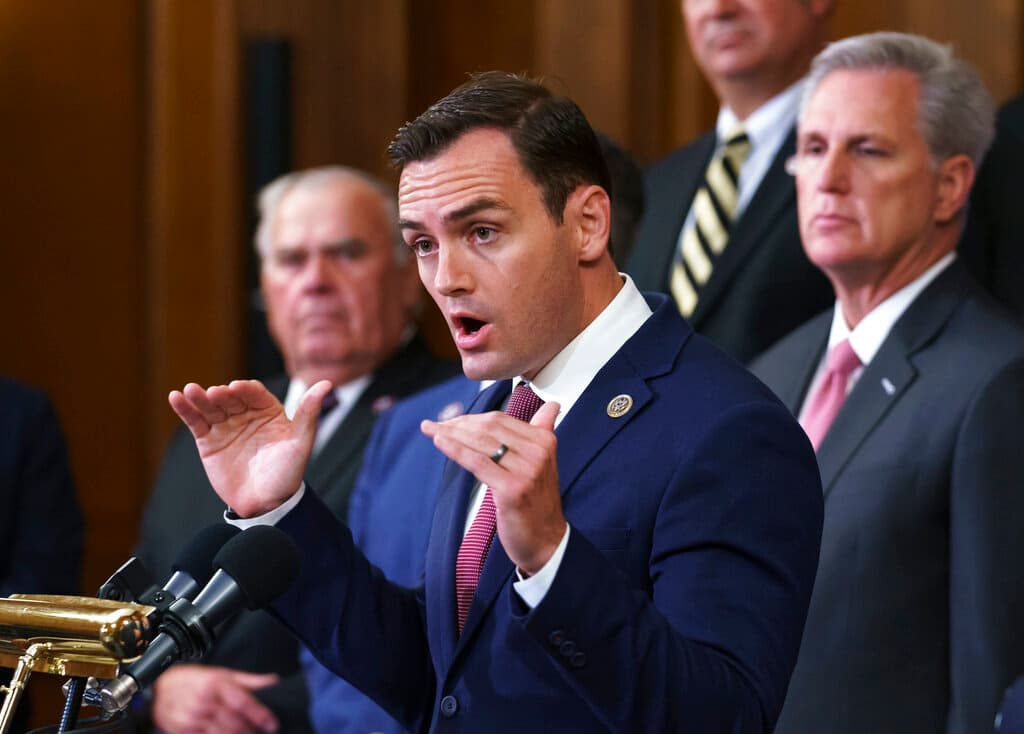New Bill Would Prevent Universities and Public Pensions From Investing in Communist Chinese Companies
Gallagher, Hawley press drive to remove tax-exempt status from any organization owning stock in a ‘disqualified’ Chinese company.

Representative Mike Gallagher and Senator Hawley want to ban all nonprofit entities — including universities and public pension plans — from investing in Communist Chinese companies.
The two have introduced legislation – The Dump Investments in Troublesome Communist Holdings Act — that would remove tax-exempt status for any 401a, 501c, or 501d organization that owns stock in a “disqualified” Chinese company.
The legislation defines “disqualified Chinese company” as a one that is incorporated or based in China, has more than 10 percent of the stock owned by some combination of Chinese entities, or is directly or indirectly owned by a Chinese entity.
If passed — the sponsors hope to get it into the next National Defense Authorization Act — the bill would cut off an enormous source of funds potentially available to Chinese companies. The Education Department reckons endowment funds of American colleges and universities totaled $691 billion at the end of 2020. Fed Data suggest public pension plans are even larger, at $5.12 trillion.
Mr. Gallagher argues that these investments not only “run contrary to Wall Street and some prestigious universities’ proclaimed commitments to ESG,” but that these “investments undermine national security by aiding the People’s Liberation Army” and “help the CCP finance its techno-totalitarian state.”
Mr. Gallagher also believes that such investment “creates interests” in the United States “that are financially invested in the success of CCP-directed companies that want to harm the U.S. or gain a competitive edge over their American rivals.”
“Tax-exempt entities that invest in CCP-directed companies are not only profiting off of genocide, destroying the environment, and financing the PLA’s ability to build weapons that can kill Americans, but are also making U.S. taxpayers unwittingly subsidize it. This has to stop,” he said.
“Any entity that receives preferential tax treatment must make a choice: are they committed to their professed values, or are they committed to financing a genocidal communist regime and its malign efforts around the world? If a tax-exempt entity chooses to continue to sell out its own country for a small slice of the Chinese market, then they must lose their tax-exempt status.”
Mr. Hawley, in a statement, echoes his views: “Universities, foundations, and other entities are exempt from federal income tax for their work promoting the public good in the United States. Investing in China does the opposite: it advances the economic ambitions and military modernization efforts of the Chinese Communist Party while selling out American workers and values. These tax-exempt entities must stop investing in China or lose their tax-exempt status.”
This bill isn’t the first, or only, effort to force American universities to divest from Chinese companies. In August 2020, the State Department sent a letter to American colleges and universities warning them to divest from China, one of a series of efforts by President Trump to discourage such investment.
“The boards of your institution’s endowment funds have a moral obligation, and perhaps even a fiduciary duty, to ensure that your institution has clean investments and clean endowment funds,” wrote the undersecretary for economic growth, energy and the environment, Keith Krach.
Asked today for his views on the DITCH Act, Mr. Krach says, “Congress has a role to play in protecting U.S. taxpayers, most of whom have no idea that their money — held in pension funds, 401Ks, and brokerage accounts — is financing Chinese military, security, and intelligence apparatus, as well as the CCP’s genocide of Uyghurs in Xinjiang.”
There is also an effort by students at campuses around the country to force their schools to divest from China, largely on human rights grounds. Athenai, a bipartisan nonprofit is one of the umbrella organizations driving the divestment fight. Thus far, Yale has agreed to review its investment in China. Georgetown University’s investment board is also considering making a similar move under pressure from students.
The chief executive of Athenai, John Metz, calls the DITCH Act a “a monumental step forward in the fight for divestment from the CCP and its human rights abuses.”
Mr. Gallagher and Mr. Hawley may be targeting nonprofit entities to begin with because their tax-exempt status gives the federal government an obvious hook — and because it means that federal funds are indirectly subsidizing Chinese companies — but their ambitions are far greater.
Mr. Gallagher in particular, has written of “defunding the Chinese Communist Party” all together, and has supported a variety of efforts to cut China off from U.S. capital markets more broadly. He has co-sponsored legislation with Representative James Banks that would prevent the International Stock Index Investment Fund of the Thrift Savings Fund from investing in any entity in peer or near-peer competitor nations, and joined Mr. Banks in sending a letter to the Trump administration urging them to prohibit federal retirement money from subsidizing Chinese military companies.
He also co-sponsored legislation by Representative Michael Waltz that would prohibit Thrift Savings Plan funds from being invested in a security that is listed on an exchange in a jurisdiction in which the Public Company Accounting Oversight Board is prevented from conducting the mandatory inspection or investigation of a registered public accounting firm, which targets China.

